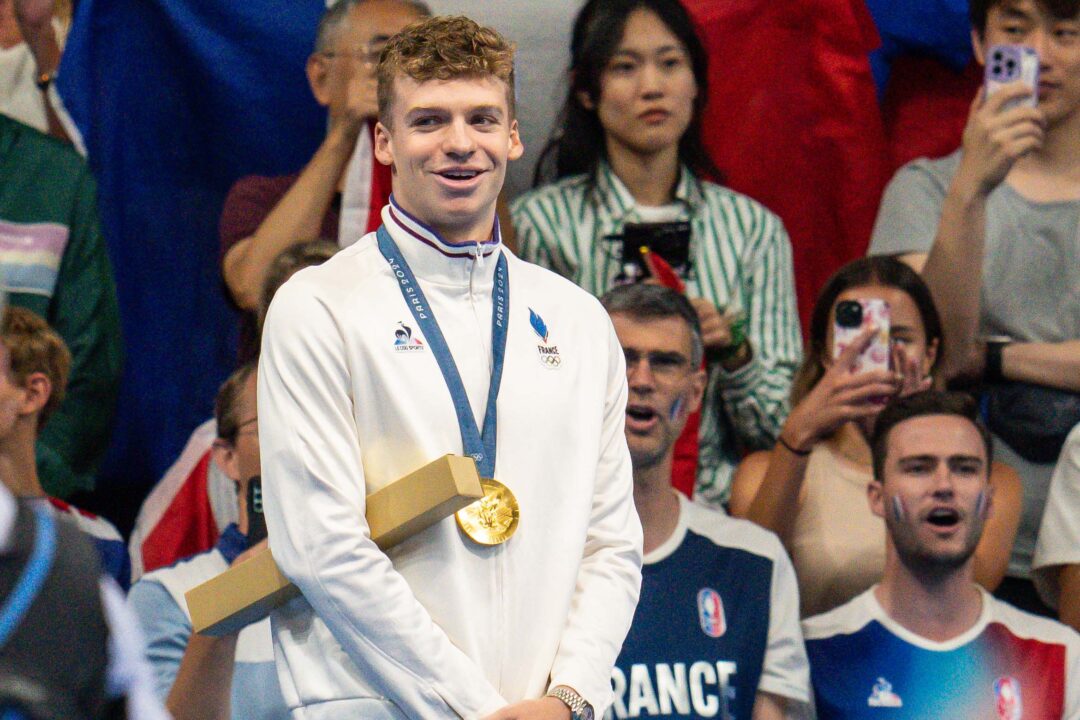With all the talk about the Paris pool being “slow” during the Olympics, and then watching Leon Marchand break four Olympic records in front of a home crowd, I came to wonder– how much does a host country’s pool affect their home-grown swimmers? From competing at your home pool during a high school or college dual meet all the way to representing your nation at a home Olympics, there’s a certain sense of pride that comes with swimming in front of a familiar crowd.
So, how does a familiar environment aid a swimmer’s performance? Let’s take a look at some data behind the world records and previous Olympic Games to see if anything stands out.
WORLD RECORDS
We watched Kristof Milak break the world record in the 200 butterfly to a roaring crowd in Budapest, and we recently felt the energy and passion from the French fans, listening to “Allez les Bleus” every time a French swimmer stepped onto the blocks. Several swimmers have broken world records on familiar soil, raising a few questions as to what exactly propelled these swimmers to swim as fast as they did. The following long course world records were broken by a swimmer in their home country:
Men
Cesar Cielo:
- 50 Freestyle (20.91) – 2009 Brazilian Championships; São Paulo, Brazil
Kliment Kolesnikov:
- 50 Backstroke (23.55) – 2023 Russian Cup; Kazan, Russia
Kristof Milak:
- 200 Butterfly (1:50.34) – 2022 World Championships; Budapest, Hungary
Women
Ariarne Titmus:
- 200 Freestyle (1:52.55) – 2024 Australian Olympic Trials; Brisbane, Australia
Katie Ledecky:
- 1500 Freestyle (15:20.48) – 2018 TYR Pro Swim Series; Indianapolis, USA
Regan Smith:
- 100 Backstroke (57.13) – 2024 US Olympic Trials; Indianapolis, USA
Kaylee McKeown:
- 200 Backstroke (2:03.14) – 2023 NSW State Championships; Sydney, Australia
Evgeniia Chikunova:
- 200 Breaststroke (2:17.55) – 2023 Russian Championships; Kazan, Russia
Sarah Sjostrom:
- 50 Butterfly (24.43) – 2014 Swedish Championships; Borås, Sweden
Gretchen Walsh:
- 100 Butterfly (55.18) – 2024 US Olympic Trials; Indianapolis, USA
Liu Zige:
- 200 Butterfly (2:01.81) – 2009 Chinese National Games; Jinan, China
Summer McIntosh:
- 400 IM (4:24.38) – 2024 Canadian Trials; Toronto, Canada
With over half of the women’s world records going down in the record-holder’s home country, there’s something to be said about the competition location. It’s not a cut-and-dry answer as to what makes a swimmer break a world record in their own nation. Maybe it’s the comfort of competing not far from your own home, or the added pressure to perform in front of your home crowd, or even the desire to just make an international team for the chance to compete for your country (many of the aforementioned records went down at an international team trial).
OLYMPIC PERFORMANCE
Looking now at the highest level, does the added knowledge of competing at the Olympics in your home country affect your total medal count? This year, the host nation of France won seven medals in the pool, four from Leon Marchand, one each from Anastasia Kirpichnikova and Florent Manaudou, and another from the men’s 400 Medley Relay. They scored 64 medals across all sports, 31 more than the 33 that they scored in Tokyo. Their seven medals in the pool is a significant uptick in medals from 2021, where Manaudou scored their lone medal. We won’t know until 2028 if France can continue this streak, but we can look to host nations from the past to see if there’s a trend. Here are the past 10 Olympic hosts and how they’ve fared in terms of overall medal count as well as in the pool.
2024 Paris Olympics
| 2024 Host Nation: France | ||||
| Total Medals (2024) | Total Medals (2021) | Percent Change (Tokyo to Paris) | ||
| 64 | 33 | 93.94% | ||
| Swimming Medals (2024) | Swimming Medals (2021) | Percent Change (Tokyo to Paris) | ||
| 7 | 1 | 600.00% |
2021 Tokyo Olympics
| 2021 Host Nation: Japan | ||||
| Total Medals (2024) | Total Medals (2021) | Total Medals (2016) | Percent Change (Rio to Tokyo) | Percent Change (Tokyo to Paris) |
| 45 | 58 | 41 | 41.46% | -22.41% |
| Swimming Medals (2024) | Swimming Medals (2021) | Swimming Medals (2016) | Percent Change (Rio to Tokyo) | Percent Change (Tokyo to Paris) |
| 1 | 3 | 7 | -57.14% | -66.67% |
2016 Rio Olympics
| 2016 Host Nation: Brazil | ||||
| Total Medals (2021) | Total Medals (2016) | Total Medals (2012) | Percent Change (London to Rio) | Percent Change (Rio to Tokyo) |
| 21 | 19 | 17 | 11.76% | 10.53% |
| Swimming Medals (2021) | Swimming Medals (2016) | Swimming Medals (2012) | Percent Change (London to Rio) | Percent Change (Rio to Tokyo) |
| 3 | 1 | 2 | -50.00% | 200.00% |
2012 London Olympics
| 2012 Host Nation: Great Britain | ||||
| Total Medals (2016) | Total Medals (2012) | Total Medals (2008) | Percent Change (Beijing to London) | Percent Change (London to Rio) |
| 67 | 65 | 51 | 27.45% | 3.08% |
| Swimming Medals (2016) | Swimming Medals (2012) | Swimming Medals (2008) | Percent Change (Beijing to London) | Percent Change (London to Rio) |
| 6 | 3 | 6 | -50.00% | 100.00% |
2008 Beijing Olympics
| 2008 Host Nation: China | ||||
| Total Medals (2012) | Total Medals (2008) | Total Medals (2004) | Percent Change (Athens to Beijing) | Percent Change (Beijing to London) |
| 92 | 100 | 63 | 58.73% | -8.00% |
| Swimming Medals (2012) | Swimming Medals (2008) | Swimming Medals (2004) | Percent Change (Athens to Beijing) | Percent Change (Beijing to London) |
| 10 | 6 | 2 | 200.00% | 66.67% |
2004 Athens Olympics
| 2004 Host Nation: Greece | ||||
| Total Medals (2008) | Total Medals (2004) | Total Medals (2000) | Percent Change (Sydney to Athens) | Percent Change (Athens to Beijing) |
| 3 | 16 | 13 | 23.08% | -81.25% |
| Swimming Medals (2008) | Swimming Medals (2004) | Swimming Medals (2000) | Percent Change (Sydney to Athens) | Percent Change (Athens to Beijing) |
| 0 | 0 | 0 | N/A | N/A |
2000 Sydney Olympics
| 2000 Host Nation: Australia | ||||
| Total Medals (2004) | Total Medals (2000) | Total Medals (1996) | Percent Change (Atlanta to Sydney) | Percent Change (Sydney to Athens) |
| 50 | 58 | 41 | 41.46% | -13.79% |
| Swimming Medals (2004) | Swimming Medals (2000) | Swimming Medals (1996) | Percent Change (Atlanta to Sydney) | Percent Change (Sydney to Athens) |
| 15 | 18 | 12 | 50.00% | -16.67% |
1996 Atlanta Olympics
| 1996 Host Nation: USA | ||||
| Total Medals (2000) | Total Medals (1996) | Total Medals (1992) | Percent Change (Barcelona to Atlanta) | Percent Change (Atlanta to Sydney) |
| 93 | 101 | 108 | -6.48% | -7.92% |
| Swimming Medals (2000) | Swimming Medals (1996) | Swimming Medals (1992) | Percent Change (Barcelona to Atlanta) | Percent Change (Atlanta to Sydney) |
| 33 | 26 | 27 | -3.70% | 26.92% |
1992 Barcelona Olympics
| 1992 Host Nation: Spain | ||||
| Total Medals (1996) | Total Medals (1992) | Total Medals (1988) | Percent Change (Seoul to Barcelona) | Percent Change (Barcelona to Atlanta) |
| 17 | 22 | 4 | 450.00% | -22.73% |
| Swimming Medals (1996) | Swimming Medals (1992) | Swimming Medals (1988) | Percent Change (Seoul to Barcelona) | Percent Change (Barcelona to Atlanta) |
| 0 | 1 | 1 | 0.00% | -100.00% |
1988 Seoul Olympics
| 1988 Host Nation: South Korea | ||||
| Total Medals (1992) | Total Medals (1988) | Total Medals (1984) | Percent Change (Los Angeles to Seoul) | Percent Change (Seoul to Barcelona) |
| 29 | 33 | 19 | 73.68% | -12.12% |
| Swimming Medals (1992) | Swimming Medals (1988) | Swimming Medals (1984) | Percent Change (Los Angeles to Seoul) | Percent Change (Seoul to Barcelona) |
| 0 | 0 | 0 | N/A | N/A |
Looking at this medal data from the past few Olympic Games, hosting seems to have a lasting effect on a country’s total medal count, with nine of the past ten host nations (all except for the United States in 1996) improving their overall medal performance on their own turf.
However, the boost in total medals doesn’t seem to apply as heavily to the pool. Only three nations, France, China, and Australia improved their swimming performance from the prior Games during their home Olympics. When comparing this data, swimming is much more finicky than the overall athletic comparison, with such a small pool of athletes actually scoring medals.
A single swimmer can make or break a country’s performance, as we saw with Leon Marchand alone winning five medals this year. Even if Marchand hadn’t swam, Kirpichnikova and Manaudou would’ve still earned more swimming medals than France did in 2021. China was beginning to find its stride in the pool in 2008, and they came off of a lackluster 2004 performance in the pool. In 2008, they were supplemented by (current world record holders) Zhang Lin and Liu Zige who made their Olympic medal debuts.
It was common for the host countries with smaller athlete delegations (like Spain and South Korea) to see a massive uptick in the year they hosted, and continue their momentum into the next Olympiad with slightly fewer medals. Other countries, like Greece, recorded an increase and medals, and then faced a steep dropoff for the next competition. Bigger nations, like the United States, Great Britain, and Australia stayed in a similar range of medals during their own Olympics as well as their bookending games.
OLYMPIC TRIVIA
The following host nations did not have any swimming medalists during their home games:
- Brazil, (Rio de Janeiro 2016)
- Greece, (Athens 2004)
- South Korea, (Seoul 1988)
- Italy, (Rome 1960)
- Finland (Helsinki, 1952)
- France (Paris, 1924)
The United States and Soviet Union have had the most success swimming at their home games, with superstar squads and boycotts in the early 1980s both contributing to high medal totals. In 1980 at the Moscow Olympics, many countries around the world boycotted the Soviet Union’s invasion of Afghanistan, allowing the USSR and East Germany to run rampant in the medal counts. The USSR earned 22 medals in Moscow, that number heavily bolstered by the fact that the United States was absent.
A very similar boycott happened in 1984, when many former Eastern Bloc countries abstained from competing at the Los Angeles Olympics. With a full generation of swimmers like Rowdy Gaines, Mary T. Meagher, and Tracy Caulkins leading the stars and stripes, the United States won 34 total medals, the most (by far) of any that year. This 34-medal-record still stands as the most medals won by a host country in the pool. The next best performance comes from the 1996 Olympics in Atlanta, where the United States earned 26 medals.

